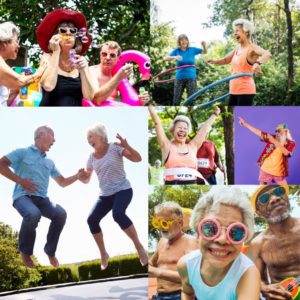Shifting the Conversation
By Robin Bush
ISR Communications
According to the Harvard Medical School, there are six ways you can prepare to” age well.” Although all are practical advice, there is something else we need to consider: how do we think about and talk about aging? First, here is the practical advice Harvard offers:
- Adapt your home – railings, shower bars, etc. Do an annual safety review of your home to ensure you are prepared.
- Prevent falls – remove trip hazards and loose rugs.
- Consider what housing options might be available at different stages of your elderhood; research options locally or near family.
- Talk with family members or friends about how to get help when you need it. Services like Meals on Wheels or Medical Transportation offered by Island Senior Resources can help provide nutritious meals or rides to medical appointments. Who could clean your home? Who do you trust to pay your bills and do your banking?
- Plan for emergencies. Who would you call if you could? Do you have a personal assistance device? Keep emergency numbers near each phone or on speed dial. Carry a cell phone.
- Write advance directives such as a living will, healthcare directive, and a durable power of attorney for health care.
Those are practical and vital considerations, but it is time we all work to change the conversation and social mindset around aging. Can we shift from fearing the aging process to embracing the enduring value of those of us in this stage of life and celebrating our accumulated decades of experience? How? The answer lies partly in how we present who we are in our older years and the positive aspects of aging — what we can do vs. what we cannot.
We are surrounded by a negative societal stigma of aging. It’s the one thing everyone has in common, yet we don’t like to talk about it. Our family members and friends worry about our decline and pass their fears to us. It’s time we, and they, recognize that getting older does not mean impending doom on the horizon and that we are bound to become feeble and unable to think or care for ourselves. That may happen at some point, and it is wise to be prepared. Still, until it is a reality, we can choose to focus on building our physical and emotional strength, managing stress, learning new things to keep our minds engaged, being grateful, and taking charge of how we react to problems. We must tell others a new story — aging is something to celebrate.
As we age, our bodies will change. Challenges will inevitably present themselves – some predictable, some not. We may experience a sense of increasing loss as loved ones pass, or we lose mobility and capabilities. Rather than making that the focus of what we share when talking to others, we can create conversations around how resilient we are. We have learned a lifetime of wisdom and can become valuable mentors for those willing to listen. We don’t have to be on our way OUT; we can be on our way UP! Yes, we must prepare our homes to stay safe, organize our affairs, and plan for emergencies. But now, previously career or family-centric, we may become more involved in volunteering, activism, or giving our time or resources. Our job is to continue finding new ways to thrive regardless of age.
It’s important not to sweep changes under the rug and ignore them; things don’t get better by refusing to acknowledge them. But it helps if we face changes with humor, playfulness, and laughter. Rather than worrying about what may come next, look for joy in where you are today. Everyone has something or somewhere that nourishes their spirit and helps us feel connected to what matters most, so go find yours. Show others the best you. Show them your emotional vitality and resilience. Help them think of you as the most vibrant, creative, upbeat person they know. Doing this will change how you and they think about aging. The more we can help those who come after us to believe that aging is something to celebrate, not fear, the better their aging process will be. Isn’t that a legacy gift you’d want to give?
“The desire for vitality is not age denial. We are not defying age when we live with strength, passion, creativity, and purpose. These qualities have nothing to do with age. They are about a state of mind – not a date of birth.” — Marc Middleton

